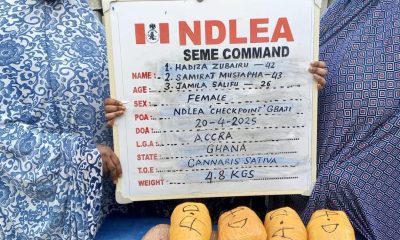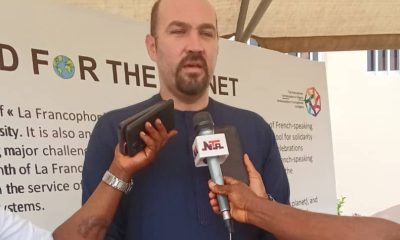Economy
CBN introduces electronic FX matching system for transactions

In a major shift aimed at reforming the Nigerian Foreign Exchange Market (NFEM), the Central Bank of Nigeria (CBN) has announced the introduction of the Electronic Foreign Exchange Matching System (EFEMS) for foreign exchange (FX) transactions.
This digital platform is expected to improve the governance and transparency of the interbank FX market with full implementation set for December 1, 2024.
In a circular addressed to Authorised Dealers on Thursday, Dr. Omolara O. Duke, the Director of the CBN’s Financial Markets Department, outlined the details of the system.
According to the circular, a two-week test run of the EFEMS will be conducted in November 2024 before the official launch in December.
The test run aims to ensure that Authorised Dealers and relevant market participants are familiar with the system and that all technical aspects are fully integrated before going live.
Once operational, all FX transactions in the interbank market will be conducted on this electronic system, which has been approved by the CBN.
Transactions will be reflected immediately in real time, providing better transparency to market participants.
The system is also expected to reduce speculative activities that often distort the market and give the CBN improved oversight to regulate the market effectively.
The new EFEMS is poised to enhance the governance of the Nigerian FX market as the CBN has framed EFEMS as a tool that will improve transparency, thereby fostering a market-driven exchange rate.
In her statement, Dr. Duke emphasised the system would “facilitate a market-driven exchange rate that will be accessible to the public.”
By publishing real-time prices and buy/sell orders data, EFEMS will make it easier for market participants, including businesses and individuals, to access reliable information on FX rates. This development is expected to address the lack of transparency that has plagued the FX market, leading to more informed decision-making by market players. In addition, it will allow the CBN to have an enhanced supervisory role, as the system will provide improved monitoring capabilities.
The introduction of EFEMS comes as part of the CBN’s broader effort to curb speculative activities that often distort the true value of the Nigerian naira. Speculation in the FX market has led to significant volatility, contributing to a widening gap between the official and parallel market rates. By introducing a system that ensures real-time transparency, the CBN hopes to limit the ability of speculators to manipulate market prices for personal gain.
The EFEMS will also work toward eliminating market distortions by streamlining the FX transaction process. As all transactions will be conducted electronically, the risk of delays or discrepancies between quoted rates and actual transaction prices will be significantly reduced.
In order to ensure a smooth rollout of the EFEMS, the CBN has partnered with the Financial Markets Dealers Association (FMDA).
Together, they will publish the operating rules for the EFEMS, which will guide the market participants in conducting FX transactions. In addition, the Nigerian FX Code and revised Market Operating Guidelines for the NFEM will provide further guidance to market participants, ensuring adherence to the highest standards of practice.
The FMDA will also play a key role in ensuring that Authorised Dealers comply with the operational requirements of the new system. This includes ensuring that the necessary documentation, training, and system integrations are completed ahead of the December 1st go-live date.
The CBN’s directive places significant responsibility on Authorised Dealers, who are required to comply with all existing guidelines and regulations governing the NFEM. As part of their obligations, they must ensure that their systems are fully integrated with the EFEMS platform before the implementation date.
Dealers are also mandated to complete training on the use of the EFEMS to ensure that all market participants are well-prepared for the transition. This move is critical in preventing any operational disruptions during the switchover to the new system.
The introduction of EFEMS comes at a time when the Nigerian economy is facing significant currency pressures due to external and internal factors. The CBN’s initiative is expected to provide stability to the Nigerian naira by curbing market speculation, which has contributed to exchange rate volatility.
With enhanced transparency and real-time access to FX market data, businesses will be better equipped to plan and manage their foreign exchange needs, reducing the uncertainty that has been a hallmark of the Nigerian FX market in recent years. Furthermore, the public will have greater access to FX market information, enabling individuals and businesses to make more informed decisions.
By implementing EFEMS, the CBN aims to create a more efficient and transparent market that aligns with global best practices. If successful, the system could serve as a model for other emerging markets grappling with similar challenges in their FX markets.
Economy
States face allocation cuts as agency demands N100bn monthly

The monthly statutory allocations to state governments from the federation account may decline in the coming months following an official request by the Nigeria Sovereign Investment Authority to boost the nation’s residual funds with the support of N100bn monthly.
The request, which was presented by the Managing Director and Chief Executive Officer of NSIA, Aminu Umar-Sadiq, is aimed at unlocking large-scale investments to drive Nigeria’s economic growth.
He made the request at the March revenue-sharing meeting of the Federation Account Allocation Committee held between April 14 and 15, 2025. Our correspondent obtained a copy of his presentation during the meeting on Friday.
Umar-Sadiq appealed to the committee, which includes state commissioners of finance, to consider and approve the request, with funding proposed to commence from the March FAAC allocation.
The presentation was titled, “Activating Residual Funding for the Nigeria Sovereign Investment Authority – Unlocking Opportunities for Large-Scale Investments to Drive Nigeria’s Economic Growth.”
According to the document, the NSIA is requesting a structured monthly disbursement of N100bn from Residual Funds—revenues in the Federation Account beyond projected hydrocarbon income—to establish a Naira-based investible capital pool.
The move, the authority says, will enhance its capacity to finance critical domestic infrastructure projects.
The MD said, “The funding would position the authority as a leading sovereign wealth fund globally, promoting responsible and strategic investments for Nigeria’s economic development and enhancing its threefold mandate to build a savings base for the country, enhance the development of infrastructure, and provide stabilisation support.”
He explained that residual funds are a legitimate source of funds transferred to the authority, provided that the derivation portion of the revenue allocation formula shall not be included as part of this funding.
Economy
More Nigerians to experience poverty by 2027 – World Bank

The World Bank’s latest Africa’s Pulse report has projects a grim future for Nigeria, with poverty expected to rise by 3.6 percentage points by 2027.
Released during the IMF and World Bank Spring Meetings in Washington, DC, the report cites Nigeria’s reliance on oil, economic fragility, and governance challenges as key drivers.
It highlights the country’s structural economic weaknesses, dependence on oil revenues, and national fragility as key barriers to meaningful poverty reduction.
“Poverty in resource-rich, fragile countries, including large economies like Nigeria and the Democratic Republic of Congo, is projected to increase by 3.6 percentage points between 2022 and 2027,” the report stated.
Despite recent growth in Nigeria’s non-oil sector during the last quarter of 2024, the World Bank warns that this progress is unlikely to translate into widespread poverty alleviation due to ongoing fiscal and institutional challenges.
The report emphasizes that Sub-Saharan Africa remains the world’s poorest region, with an overwhelming 80% of the globe’s 695 million extreme poor residing there in 2024.
Within the region, half of the 560 million extremely poor people were located in just four countries, including Nigeria.
In stark contrast, South Asia accounted for 8% of the world’s extremely poor population, East Asia and the Pacific 2%, the Middle East and North Africa 5%, and Latin America and the Caribbean 3%.
The World Bank attributes the rising poverty in Nigeria and similar economies to weakening oil prices and fragile governance structures, noting: “This follows a well-established pattern whereby resource wealth combined with fragility or conflict is associated with the highest poverty rates, averaging 46% in 2024, which is 13 percentage points higher than in non-fragile, resource-rich countries.”
Meanwhile, non-resource-rich countries in Africa are experiencing stronger economic growth and faster poverty reduction, buoyed by high agricultural commodity prices and more resilient fiscal policies.
To reverse Nigeria’s downward poverty trend, the World Bank recommends reforms that prioritize inclusive economic growth and stronger public financial management.
It calls on the government to focus on “improving fiscal management and building a stronger fiscal contract with citizens to promote inclusive economic development and long-term poverty alleviation.”
Economy
SEE current exchange rate of the Dollar to Naira

What Is the Dollar to Naira Exchange Rate at the Black Market (Aboki FX)?
Here is the Dollar to Naira exchange rate at the parallel market, popularly known as the black market (Aboki fx), for Tuesday, April 23, 2025.
You can exchange your dollars for naira at the following rates:
Black Market Exchange Rate (Lagos – April 23, 2025):
According to sources at the Bureau De Change (BDC), the exchange rate at the Lagos parallel market saw traders buying at ₦1610 and selling at ₦1620 per US dollar.
It’s important to note that the Central Bank of Nigeria (CBN) does not recognize the black market. The CBN advises individuals seeking foreign exchange transactions to do so through their banks.
Dollar to Naira Exchange Rates
Market Type Buying Rate Selling Rate
Black Market ₦1610 ₦1620
CBN Official Rate ₦1591 (Low) ₦1606 (High)
Note: Forex rates vary across dealers and regions, and actual rates may differ from those listed.
Meanwhile, the Nigeria Customs Service (NCS) has announced the seizure of 298 smuggled items worth ₦7.6 billion between January and March 2025. The NCS also disclosed that it generated a total revenue of ₦1.75 trillion in the first quarter of the year.
-

 News18 hours ago
News18 hours agoGunmen abduct two senior LG workers, three others
-

 News3 hours ago
News3 hours agoJust in: Senator Natasha tenders satirical ‘apology’ to Akpabio
-

 News20 hours ago
News20 hours agoNDLEA storms Lagos hotel, recovers N1.042billion illicit drug consignments(Photos)
-

 News20 hours ago
News20 hours agoArmy Chief condemns beating, harassing civilians in military uniform says, it’s wrong
-

 News12 hours ago
News12 hours agoBenue LG chairman gives Fulanis 48hrs to leave all farmlands
-

 News17 hours ago
News17 hours agoFrancophone Ambassadors, Nigeria Unite To Fight Against Climate Change
-

 News12 hours ago
News12 hours agoFive suspected kidnappers eliminated by police in Delta
-

 Sports20 hours ago
Sports20 hours agoCopa del Rey: Barca pumel Real Madrid 3-2 to emerge winner





